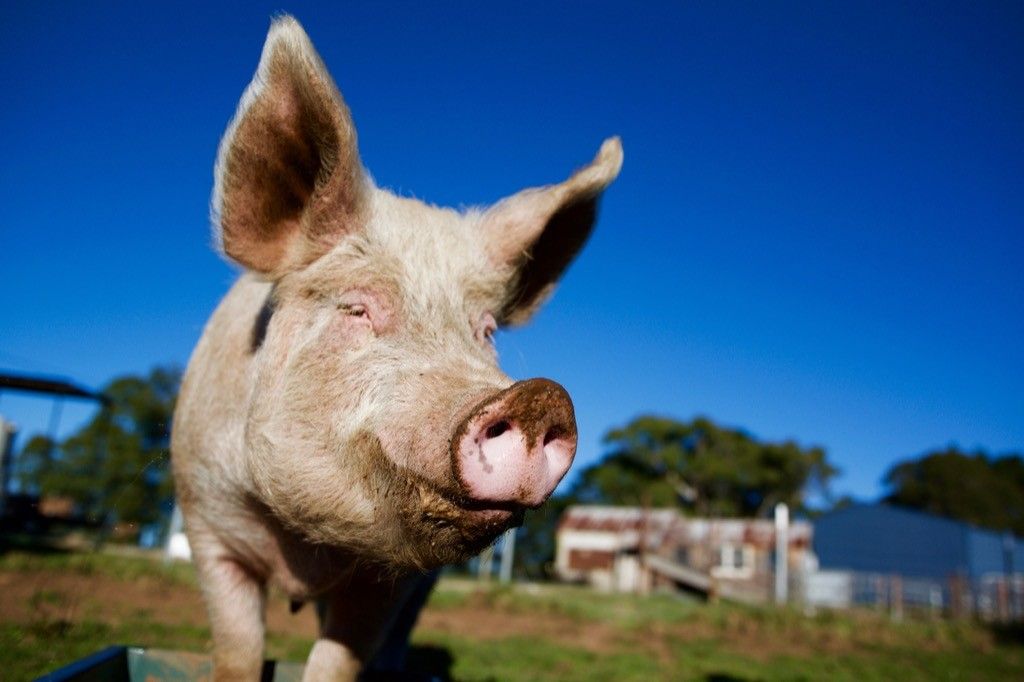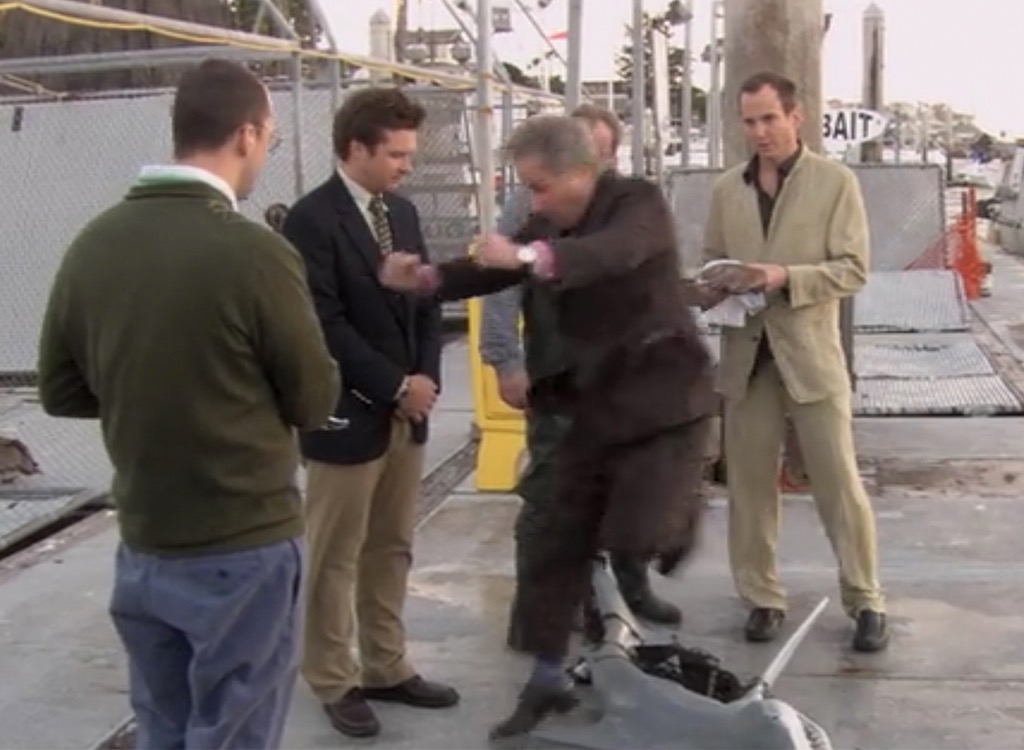
If you grow up hearing certain expressions or phrases all the time, it can be easy to overlook how weird they actually are. That's the case with a number of Americanisms—American sayings we are so used to uttering that we forget they don't actually make any sense or have been so removed from their original meanings that it takes a linguist to connect them. Often it can take an outsider to point out just how strange some American expressions are—a foreigner who can raise an eyebrow in confusion to the turn of phrase that many in the U.S. take for granted. Here are 30 of these American phrases that leave non-Americans scratching their heads. And for actions that count as Americanisms, see the 30 American Activities That Are Bizarre to Foreigners.
1
"Piece of cake."

One of the best-known American phrases, it's no piece of cake for newcomers to the U.S. to understand what we're talking about or where baked goods might be involved. "When I started school in second grade, the teacher asked a pretty easy (I assume) question," writes a German-born Reddit user about first coming to the U.S. "I heard everyone say it was 'a piece of cake.' And for the longest time I always wondered where this cake was." And to update your vocabulary, pepper your speech with these 30 Hilarious Words for Everyday Problems.
2
"Scoot over."

Americans might casually say this when asking someone to move slightly, but those who aren't familiar with the term can be forgiven for not having a clue what the American is asking them to do. "My first day of school in the U.S., this girl asked me to 'scoot over,'" writes one non-American on Reddit. "And I just thought 'What? I don't even have a scooter with me.'"
3
"Put lipstick on a pig."

This weird colloquialism to describe trying to superficially improve something that's ugly or deficient makes sense when you explain it to an outsider, but, as Bustle's JR Thorpe puts it, "One of the main reasons the rest of the world finds American politics bizarre is that, often, we don't understand what on earth your politicians are saying. They're very fond, for instance, of this utterly bizarre expression, which seems to have a fairly straightforward meaning, but is truly, weirdly American, with its connotations of down-home farms and Avon salesmen." And for more on how strange our country can be, learn the The 40 Most Enduring Myths in American History.
4
"Break a leg."

When directly translated, this American phrase sounds to a non-English speaker that the speaker is wishing them ill will or putting some kind of curse on them. In fact, the term means exactly the opposite—a term of good luck that by saying it is supposed to make sure it does not actually happen. What could be confusing about that?
5
"Knock on wood."

Sort of the opposite of "break a leg," this expression, said (and done) when someone hopes something happens or continues to happen is common throughout the English speaking world (usually as "touch wood" outside America). Unfortunately, those learning the language can't always quite piece together what it means, with little context given to all this sudden knocking on tables and doors.
6
"Not a big fan."

"I'm from Ukraine, and I find it really strange when people say they're 'not a big fan of…' instead of saying they don't like something," says one Reddit user.
7
"It's not rocket science."

Similar to "not a big fan," "it's not rocket science" is a way of explaining something by hyperbolically explaining what it's not—in this case, saying something is not too difficult. But for an outsider to the U.S., it might have them asking, "What do rockets have to do with anything?"
8
"Break a bill."

When we want to get change, turning a larger bill into smaller ones, this term can come in handy. But as one Reddit user pointed out, the expression is not used outside the U.S., creating confusion for non-Americans. "The term I use the most and when I travel people give me a funny look is when I ask for someone to 'break' a bill for me," writes the user. And for fascinating info about cash, learn the 20 Crazy Facts You Never Knew About One Dollar Bills.
9
"Mystery meat"

Talking about SPAM or some unpleasant looking meat-based dish sold in a cafeteria with seemingly unknown origins (is it from a pig? A cat?), Americans are fond of this term, but the American phrase can also seem a bit mysterious to outsiders. "Who on earth legalizes this substance, why is it served to children, and what possibly possessed the Board of Health to let it become so common it's an idiom?," asks Thorpe. "Australia has its own weird kind of mystery meat, called 'devon,' which is just random parts of pork put into a sausage—but at least we know it all comes from the same animal."
10
"Fanny pack"

Those tacky zippered packs that strap around your waist may be making a high-fashion comeback, but that won't make the term any less hilarious and weird to British visitors. "Here in the U.K. fanny [means something vulgar]," says Huffington Post reader Sonia Atkins. "I found that hilarious and struggled to keep a straight face whenever any of my American colleagues used the word fanny."
11
"Let's table this."

This American phrase seems to mean the opposite of what actually means, according to Huffington Post reader Mary Shirley. "When you say to table something you mean to shelve it. When I say to table something I mean to put it on the table for discussion i.e., put it on the agenda."
12
"Don't be such a wet blanket."

When someone is being a downer or ruining everyone else's good time, we may use this expression, leaving foreigners to ask, "What's that have to do with blankets?" "Who looked at a particularly boring, fun-sucking person at a party, equated them to being smothered in a sodden piece of fabric, and let the idiom be born?" asks Thorpe. "It's ingenuity like that which makes America the home of so many start-up founders, I'm sure of it."
13
"Jump the shark"

Plenty of Americans don't totally get why we use this phrase to describe when a TV show or some other work goes on longer than it should. Though the phrase originated with an episode of Happy Days late in the series' run, it's come to serve as shorthand for when something ceases to be culturally relevant—or any good—but for those hearing it for the first time, the visual phrase is an odd way to say this. And for more insight into the phrase, including how it popped up on non-Happy Days TV, learn the The 50 Funniest Jokes From Arrested Development.
14
"Long in the tooth"

A phrase that can sometimes be used in the same way as "jump the shark," this one also refers to something that's gotten old or gone on for too long. Though it originated as a term referring to horses, whose teeth continue to grow as they age, a non-English speaker hearing it for the first time an imagine the speaker is referring to someone who literally has long teeth.
15
"Green thumb"

"Green thumb" is yet another phrase that brings to mind a literal image (a person whose thumb is the color green) that doesn't describe what it's actually referring to (a person who's handy with gardening). But also, it seems weird to focus on one digit that wouldn't seem to necessarily be used more than the others. "In Britain, they speak of a gifted gardener having 'green fingers,'" says the Word Detective.
16
"Keeper"

"I was talking to some Spanish people a while back, and they were shocked by the term 'keeper' to refer to a good [significant other] (e.g. 'Your boyfriend opened the door for me, he's a keeper.') They thought it was awful to refer to 'keeping' a person," says one reddit user.
17
"Horseback riding"

This one is not so much confusing to outsiders as simply superfluous. "Where else would you sit?" asks Huffington Post reader Jaclyn Currie.
18
"Ate it"

"Heard an American say 'he ate [it]' when someone fell over…it baffled me," says a user on Reddit. And for hilarious instances of this, check out these 50 Epic Fails We Can't Stop Laughing at.
19
"How are you?"

Visiting foreigners often comment on just how friendly Americans tend to be, even to complete strangers. But the most confusing aspect about this openness is our tendency to ask people, "How are you?" "Took me a while to figure out that they just mean 'hi,'" said Huffington Post reader Nynke Bottinga. As one redditor says about hearing the expression, "I actually answered, until I figured it out. It was very awkward."
20
"Period."

When we're being dramatic or trying to emphasize a point, Americans will occasionally add "period" to the end of their sentence. For us, it might seem like a powerful statement, but for outsiders, it can just seem weird. "It sometimes makes their statement have less of an impact, where it seems to be intended to make more of one," says one British Huffington Post reader.
21
"Behind the eight ball."

Anyone with pool-playing experience knows this means being in a tough spot with a practically impossible-to-bank shot. But for those hearing it for the first time and not particularly familiar with pool, it can be a baffling American expression.
22
"Working the graveyard shift"

"A friend told me once that her husband was doing that and I thought he got a job at the cemetery. Makes zero sense to me!" says Huffington Post reader Josiane Rocha. After all, they're likely not working at an actual cemetery, and even if they were, it's unlikely they would be there in the middle of the night—work at the graveyard happens during the day, just like everywhere else.
23
"Canadian bacon"

This one really throws our northern neighbor. "In Canada, if I say 'bacon' without any qualifiers, I mean those strips of pork and fat that you fry," asks one Canadian redditor. "Is this what Americans mean by 'bacon?' If so, then what is 'Canadian bacon?'"
24
"First base," "second base"

"All the bases in terms of contact with a [member of the opposite sex]" confuse one Reddit user. "They're not used widely outside of the U.S. I've never heard my friends use them." It doesn't help that pretty much no countries outside the U.S. are that into baseball and so terms pulled from that sport leave non-Americans clueless.
25
"Up my alley"

"I frequently get too literal with my sayings," a Korean redditor writes. "My wife is particularly amused when I say 'bread maker' instead of 'bread winner' or when I refer to something as 'down my aisle' rather than 'up my alley.'"
26
"Under the weather"

Feeling sick or less than healthy might lead an American to say they feel "under the weather," leaving any non-English speakers translating it to feel totally confused as they try to work out how someone can physically be "under" weather. "My dad's girlfriend works with people from around the world," writes one user on Reddit. "Apparently 'under the weather' is not a common phrase outside the U.S."
27
"Tell me about it."

When a foreigner hears an American say this, they can be forgiven for assuming they are simply asking them to continue talking about what they've been talking about. Instead, we usually say this to mean "I know what you mean." One non-American redditor explains: "During a normal conversation with my American friend, I told him about the weekend that I helped my friend move from SF to LA, that I was so tired after a 5 hours drive. Then he said 'yeah, tell me about it.' So I told him how I prepared for the trip, packing and moving stuff, included driving around LA to find his new apartment. It's a kinda bland story so I don't know why he wanted me to tell him about it."
28
"Shoot the breeze"

Originating from late-19th century phrasing when "breeze" referred to empty chatter or gossip, those who hear it now might imagine it has something to do with firing a gun into the air (especially when Americans are saying it).
29
"Monday-morning quarterback"

Since American football is barely followed or understood outside this country, someone hearing this American expression is likely to immediately ask, "what's a quarterback?" and "what's Monday have to do with anything?"
30
"Spill the Beans."

Supposedly originating from the voting system in ancient Greece, foreigners could be forgiven for thinking this American phrase is referring to some kind of accident in the kitchen rather than a person telling a secret or some other information that were not supposed to reveal.
To discover more amazing secrets about living your best life, click here to sign up for our FREE daily newsletter!





















